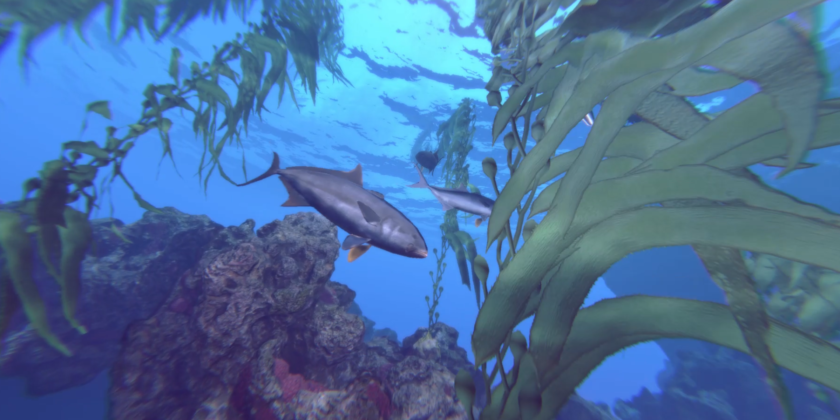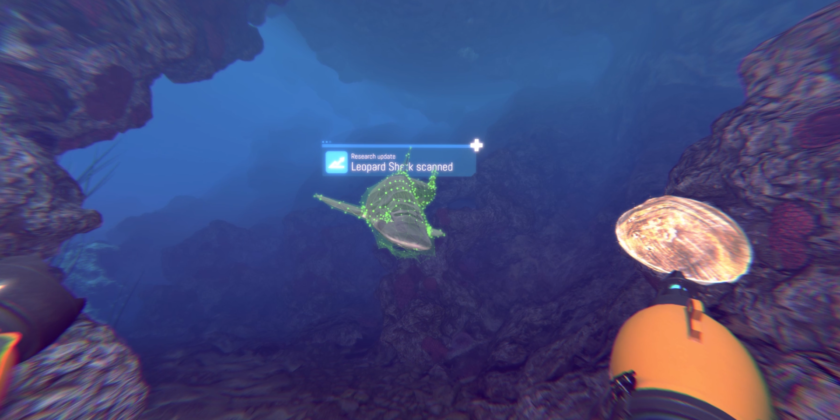Diving into VR gaming with a purpose
“We often forget that actually the best way to conserve is to have people caring about an issue, falling in love with a species, or even just changing perspective about it. I immediately loved the idea to be able to contribute to this project, as I saw a tool to reach a large audience, using a gaming tool to teach about the marine environment and the importance of every creature in it.”
-Dr Enrico Gennari
Curiscope was founded by Ed Barton and Ben Kidd on the belief that virtual and augmented reality could offer a unique way to connect more closely with the world around us. Their passion for the ocean coupled with a desire to open people’s eyes to the impact that humans have on this fragile ecosystem led Curiscope to launching its first ever VR game in December 2017. Operation Apex mixes a fully immersive gaming experience with an informative exploration of the ocean, putting the participant into deep water and the heart of the action.
The fully immersive game gives participants the chance to become part of a team of marine scientists as a research assistant, diving into an underwater world. They are sent on a mission to collect data on marine life, which reveals the impact that humans have on the ocean environment. There is a loose narrative, as participants work their way through the game; they’re also working their way up the food chain and interacting with marine life, with the ultimate aim of finding the largest great white shark ever seen.

Objectives
“It’s important as a company that we connect people to the real world. But we’ll always put this choice in the hands of the user, allowing them to discover and explore with their own free will.”
– Ed Barton, Curiscope
Operation Apex is the sequel to Curiscope’s first marine-themed VR experience, its 360 film Great White Shark, one of the most viewed VR experiences of all time, with over 27 million YouTube views. “The Great White Shark 360 film always felt like a trailer, a pre-cursor of a more ambitious future project” explains Curiscope’s co-founder, Ed Barton. “It felt like a really big issue that we could communicate in a different way”.
The objective of Operation Apex was to look at the impact humans are having on the oceans, but rather than focus on a negative experience, the team were certain that they wanted to get a clear conservation message across by showing the wonder of the ocean. Ed explains: “When you’ve got a big issue, I don’t think you necessarily solve it by putting somebody in an experience that immediately exposes the severe end of the spectrum. VR is so immersive, so transformative, that you should never force a viewpoint on someone but allow them to come to their own conclusion, much as you would do in the real world. Some of the biggest ocean advocates are divers and that’s because they’re the ones exposed to the wonder of the oceans, that’s what we need to recreate.”
Although the experience is informative, the team were mindful that they didn’t want to create an experience that was pigeon-holed as an educational tool. “I think the idea of education often springs up the idea of school and it’s not built with that purpose. We wanted to create a good VR piece that appealed to a broad range of people, including adults and children, gamers and non-gamers.”
The game was developed for the HTC Vive, giving participants the chance to control their movements underwater, with hand controllers used to replicate a swimming motion to move around. “We’ve tried experiences with teleportation to move around the environment, but we didn’t think it worked for this project. To us, it almost feels like you’re cheating if you can teleport away” explains Ed. “The feeling of movement we’ve introduced has been positively received; people love being able to move around in a unique way.”
The challenge of making it realistic and believable
Ensuring the marine environment was realistically portrayed and believable was a crucial part of the game’s development. A team of 10 coders and artists worked on the project, which was developed using Unity. All the animals were created by code, and all behave differently, so some, such as the crabs, are naturally more friendly and inquisitive, whereas others, such as the black tip shark are easily scared off and remain elusive.
The Curiscope team worked closely with research and conservation partners, including South African-based Oceans Research in pre-production to ensure the world they were replicating was accurate, including the look and behaviours of the marine life. When it came to production, this did highlight a challenge for the team. “Trying to mirror real world research which at times can be troublesome in both VR and more traditional forms of animation” explains Ed. “Mirroring something realistically doesn’t always work; in effect reality on screen can look unreal”.
Coupled with this challenge, during the production process, a loose narrative for the project emerged, having the participant move through the game by working their way up the food chain. This had the dual advantage of introducing an effective game progression, as well as reinforcing the initial objective of raising awareness of the impact of pollutants. To address this, as production progressed, the team had to repurpose and refine code, as well as add new parameters based on the different portrayals of the animals to preserve believability and work within the narrative.

A journey of discovery towards interactive VR experiences
Operation Apex is the first VR game developed by Curiscope, which took the team on their own journey of discovery and learning throughout its development.
Although the team had the right mix of people with the skills needed to develop the project, there was a still a learning curve for everyone involved. “It’s difficult to do traditional product development in VR because a lot of it is about feel, so things inevitably change as you’re working on it. This was a challenge for the team members coming from a games development background” comments Ed.
“Equally, for us, as a company being good at delivering passive VR experiences, we needed to upskill into working in an interactive VR environment. The market is completely different – people who will purchase games are very discerning; they want a long play time and to see good reviews, they like to see it on Twitch and YouTube; it’s a very important part of the equation. You have hit performance targets and you’ve got be aware that you have to be doing 90fps or thereabouts, which is difficult to do when you’re rendering an entire environment and you’re trying to make it as close to realistic as possible. There’s a lot of learning for us there.”
From initial conception to it launching in December 2017, Operation Apex was around 18 months in the making, with production taking up almost a year. For a start-up company, this was a huge undertaking. As Ed explains; “in the gaming world, the length of the production time would be nothing, but for a VR start-up, this was a big commitment. It’s hard to make a successful VR gaming business model as the market is completely different. The dilemma is balancing out the time needed to create a great product against knowing you’ve a limited market to build successful VR consumer products”.
Ed can see the potential for SMEs working in the VR gaming sector. “Operation Apex is going onto Oculus in 2018 and considering the options of moving it onto PSVR. We also have the potential to add new levels to improve the product over time too.” For the VR industry more broadly, you’ve got a market of around 4 million high end headsets, so it’s definitely possible to make a company that could succeed.”